Austeria is a polonais film of genre Drama directed by Jerzy Kawalerowicz released in USA on 1 october 1982 with Franciszek Pieczka
Austeria (1983)
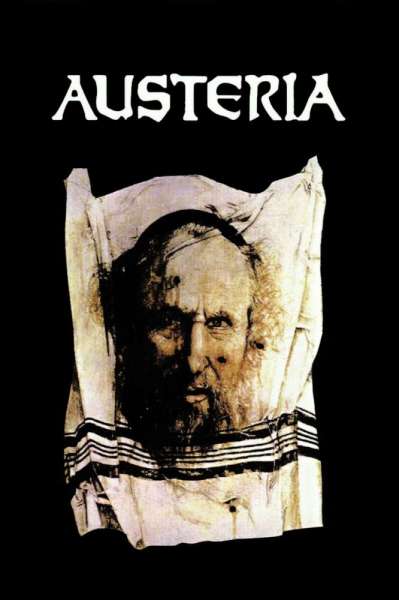
If you like this film, let us know!
Austeria (aka The Inn) is a Polish feature film directed by Jerzy Kawalerowicz, produced by Zespół Filmowy "Kadr" and released in 1983.
Austeria takes place during the opening days of World War I, in the Austro-Hungarian province of Galicia. Tag, played by Franciszek Pieczka, is a Jewish innkeeper whose inn (austeria means inn in the Polish dialect) is located near the border with the Russian Empire. War has broken out and local civilians are fleeing the advancing Russian Army. A number of refugees have taken shelter in Tag's inn for the night. A group of Hasidic Jews from the neighboring village arrive, followed by an Austrian baroness, and a Hungarian hussar, cut off from his army unit.
The film is based on a 1966 novel of the same name by Julian Stryjkowski, who collaborated with Kawalerowicz on the screenplay.
Synopsis
Premier jour de la Première Guerre mondiale. Des hassidim, venant en charrettes d’une petite ville de Galicie sont accueillis par le vieux Tag, esprit frondeur, et sa famille dans son auberge (austeria signifie auberge). En carrosse, arrive une Juive fréquentant les milieux aisés de Vienne. Elle fuit et essaie de persuader l’aubergiste de venir avec elle. Il refuse et reste avec sa belle-fille et sa petite-fille qui craignent un pogrom. La servante ukrainienne Jewdocha informe que les Cosaques approchent (nous sommes à proximité de la frontière russe). Une bataille se déroule non loin de l'auberge. D'autres fuyards qui étaient passés auparavant reviennent finalement s'abriter à l'auberge le soir. Parmi eux, le jeune Bum qui porte dans ses bras le corps de sa bien-aimée Asia. Les parents d'Asia et de Bum sont là aussi. Un tzadik (« juste » en hébreu) de Zydaczewo s'arrête lui aussi à l'auberge. Les hassidim se mettent à danser.Actors
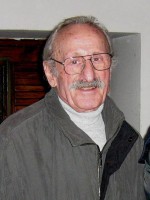
Franciszek Pieczka
(Tag)

Wojciech Pszoniak
(Rudy Josełe)

Liliana Komorowska
(Jewdocha)

Szymon Szurmiej
(Wilf)

Gołda Tencer
(Blanka Wilf)
Comments
Leave comment :
Suggestions of similar film to Austeria
There are 44 films with the same actors, 8 films with the same director, 62838 with the same cinematographic genres (including 3230 with exactly the same 2 genres than Austeria), 10121 films with the same themes (including 373 films with the same 3 themes than Austeria), to have finally 70 suggestions of similar films.If you liked Austeria, you will probably like those similar films :

Quo Vadis (2001)
, 4h34Directed by Jerzy Kawalerowicz
Origin Pologne
Genres Drama, Historical, Peplum, Romance
Themes Films set in Africa, Films about religion
Actors Paweł Deląg, Magdalena Mielcarz, Franciszek Pieczka, Bogusław Linda, Michał Bajor, Jerzy Trela
Rating57%





The central plot in the movie revolves around the love of a Roman patrician, Marcus Vinicius, towards a Christian girl (coming from the territory of modern-day Poland) set against the backdrop of the persecutions against Christians during the reign of Nero.
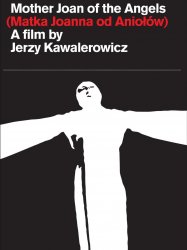
Mother Joan of the Angels (1961)
, 1h45Directed by Jerzy Kawalerowicz
Origin Pologne
Genres Drama, Horror
Themes Films about religion, Demons in film
Actors Lucyna Winnicka, Maria Chwalibóg, Stanisław Jasiukiewicz, Franciszek Pieczka
Rating74%





Set in a seventeenth century Polish convent, a priest, Father Suryn (Mieczyslaw Voit), arrives at a small inn for a night's rest. He has been sent to investigate a case of demonic possession at a nearby convent after a local priest was burnt for sexually tempting the nuns. The next day, he sets out for the convent, where he meets its abbess, Mother Joan (Lucyna Winnicka), said to be the most possessed of all the nuns. Father Suryn will have to go to hell and back to save Joan, casting himself forever into darkness for her salvation.
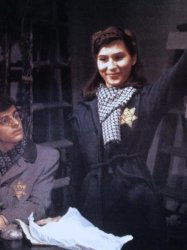
David (1979)
, 2h5Directed by Peter Lilienthal
Origin German
Genres Drama, War
Themes Films about religion, Political films, Films about Jews and Judaism
Actors Eva Mattes, Franciszek Pieczka, Dominique Horwitz, Gołda Tencer, Hanns Zischler
Rating65%






Angry Harvest (1985)
, 1h45Directed by Agnieszka Holland
Origin German
Genres Drama, War, Romance
Themes Films about religion, Political films, Films about Jews and Judaism
Actors Armin Mueller-Stahl, Elisabeth Trissenaar, Wojciech Pszoniak, Gerd Baltus, Tilly Lauenstein, Margit Carstensen
Rating70%





In the winter of 1942-43, a Jewish family leaps from a train going through Silesia. They are separated in the woods, and Leon, a local peasant who's now a farmer of some wealth, discovers the woman, Rosa, and hides her in his cellar. Leon's a middle-aged Catholic bachelor, tormented by his sexual drive. He doesn't tell Rosa he's seen signs her husband is alive, and he begs her to love him. Rosa offers herself to Leon if he'll help a local Jew in hiding who needs money. Leon pays, and love between Rosa and him does develop, but then Leon's peasant subservience and his limited empathy lead to tragedy.

Korczak (1990)
, 1h55Directed by Andrzej Wajda
Origin Pologne
Genres Drama, War, Biography, Historical
Themes Films about religion, Political films, Films about Jews and Judaism
Actors Wojciech Pszoniak, Aleksander Bardini, Ewa Dałkowska, Anna Mucha, Agnieszka Krukówna, Teresa Budzisz-Krzyżanowska
Rating73%





Le film se passe pendant la Seconde Guerre mondiale, en 1942, dans le ghetto de Varsovie. Janusz Korczak a la charge de plusieurs centaines d'orphelins : il doit subvenir à leurs besoins dans des conditions très difficiles. On peut voir, par exemple, sur des photos d'époque prises dans ces orphelinats, que les enfants étaient pieds nus.

Enclosure (1961)
, 1h45Origin France
Genres Drama, War
Themes Films about religion, Political films, Films about Jews and Judaism
Actors Hans Christian Blech, Jean Négroni, Janez Vrhovec, Pero Kvrgić, Frane Milčinski, Jean Vilar
Rating67%





En 1944, dans un camp de concentration, un officier S.S. fait placer dans un enclos spécial deux condamnés à mort : Karl, détenu politique allemand membre de l'organisation clandestine antinazie du camp, et David, juif français. On leur annonce que celui qui tuera son compagnon sera gracié.
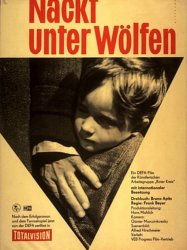
Naked Among Wolves (1963)
, 1h56Directed by Frank Beyer
Genres Drama, War
Themes Politique, Films about religion, Political films, Films about Jews and Judaism
Actors Erwin Geschonneck, Armin Mueller-Stahl, Viktor Avdyushko, Peter Sturm, Zygmunt Malanowicz, Werner Dissel
Rating71%





Buchenwald concentration camp, early 1945. A Polish prisoner named Jankowski, who has been on a death march from Auschwitz, brings a suitcase to the camp. When the inmates in the storage building open it, they discover a three-year-old child. Jankowski tells them he is the son of a couple from the Warsaw Ghetto, both of whom perished. Prisoner Kropinski becomes attached to the boy, and begs Kapo André Höfel to save him. Höfel, who is a member of the camp's secret communist underground, consults with senior member Bochow. He is instructed to send the child on the next transport to Sachsenhausen. Höfel cannot bring himself to do so, and hides him. Jankowski is deported to Sachsenhausen alone.
 , 1h34
, 1h34Directed by David Heyman, Mark Herman
Origin United-kingdom
Genres Drama, War, Comedy-drama, Historical
Themes Films about children, Films about religion, Political films, Films about Jews and Judaism
Actors Asa Butterfield, David Thewlis, Jack Scanlon, Vera Farmiga, Rupert Friend, Amber Beattie
Rating77%





An 8-year-old boy named Bruno (Asa Butterfield) lives with his family in Berlin, in Nazi Germany during the Holocaust. He learns that his father Ralf (David Thewlis) has been promoted, due to which their family, including Bruno's mother Elsa (Vera Farmiga) and 12-year-old sister Gretel (Amber Beattie), relocate to the countryside. Bruno hates his new home as there is no one to play with and very little to explore. After commenting that he has spotted people working on what he thinks is a farm in the distance, he is also forbidden from playing in the back garden.

Directed by Joan Micklin Silver
Origin USA
Genres Drama, War
Themes Films about religion, Political films, Films about Jews and Judaism
Actors Armin Mueller-Stahl, Charles Dance, Elina Löwensohn, Chad Lowe, Peter Friedman, Don McKellar
Rating58%





Ghetto de Varsovie, novembre 1942. Alors que la rebellion commence à gronder, un rabbin et sa fille tentent de survivre tout en gardant en tête leurs espoirs de paix. Celui-ci tente de contenir les excès de haine et de violence de son fils qui veut se venger de l'occupation nazie. Victime d'un viol, sa fille bénéficiera du soutien inespéré d'un jeune soldat allemand las des exactions commises par son armée…

The Night Porter (1974)
, 1h58Directed by Liliana Cavani
Origin Italie
Genres Drama, War, Romance
Themes Medical-themed films, Psychologie, Films about religion, Films about sexuality, Erotic films, BDSM in films, LGBT-related films, Films about psychiatry, Political films, Films about Jews and Judaism, LGBT-related films, LGBT-related film
Actors Dirk Bogarde, Charlotte Rampling, Philippe Leroy, Gabriele Ferzetti, Isa Miranda, Giuseppe Addobbati
Rating66%





It is 1957, 12 years after World War II. Maximilian Theo Aldorfer (Dirk Bogarde), a former Nazi SS officer who had pretended to be a doctor in order to be able to take sensational photographs in the concentration camps, and Lucia Atherton (Charlotte Rampling), a concentration camp survivor who had an ambiguous sadomasochistic relationship with Aldorfer. Flashbacks show Max tormenting Lucia, but also acting as her protector.
 Connection
Connection